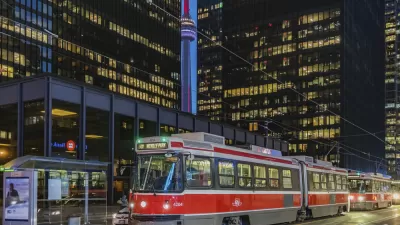The Toronto Transit Commission (TTC) is considering switching its single-trip transfer system to a more flexible time-based system allowing short return trips to be made without paying twice. Low-income and marginalized riders stand to benefit most.
Hearing the appeal of its riders, the TTC is investigating the possibility of switching to a time-based transfer system which would allow riders to re-enter the system travelling in any direction within either a 90 or 120 minute transfer window. The current system permits only one-way continuous trips and prohibits backtracking.
The time-based system - already the standard in many North American cities - would allow riders to make quick errands on a single fare but as Ben Spurr writes, “the new transfers’ most important effect would be to make public transit more equitable, by providing fare relief to the vulnerable groups who rely on the TTC the most.”
“In Toronto (as elsewhere) low-income earners are the biggest users of public transit. According to a 2010 study, 56 per cent of households earning less than $24,000 a year did not own a car, compared to 29 per cent of households making $40,000 or more.”
Transit users in Toronto are also disproportionately female (58.2%). Dr. Kara Santokie, project director for the Toronto Women’s City Alliance says “’timed transfers would ease the burden on low-income women, who are disproportionately new immigrants or from racialized groups, by allowing them to make round trips on a single fare. That’s especially important as fares continue to rise year after year.’”
Scrapping single-trip transfers would also relieve bus and streetcar operators the onerous duty of enforcing the system. The TTC estimated the switch would cost $20 million annually in lost revenue.
FULL STORY: How timed transfers would help the TTC’s most vulnerable riders

Planetizen Federal Action Tracker
A weekly monitor of how Trump’s orders and actions are impacting planners and planning in America.

Maui's Vacation Rental Debate Turns Ugly
Verbal attacks, misinformation campaigns and fistfights plague a high-stakes debate to convert thousands of vacation rentals into long-term housing.

San Francisco Suspends Traffic Calming Amidst Record Deaths
Citing “a challenging fiscal landscape,” the city will cease the program on the heels of 42 traffic deaths, including 24 pedestrians.

Defunct Pittsburgh Power Plant to Become Residential Tower
A decommissioned steam heat plant will be redeveloped into almost 100 affordable housing units.

Trump Prompts Restructuring of Transportation Research Board in “Unprecedented Overreach”
The TRB has eliminated more than half of its committees including those focused on climate, equity, and cities.

Amtrak Rolls Out New Orleans to Alabama “Mardi Gras” Train
The new service will operate morning and evening departures between Mobile and New Orleans.
Urban Design for Planners 1: Software Tools
This six-course series explores essential urban design concepts using open source software and equips planners with the tools they need to participate fully in the urban design process.
Planning for Universal Design
Learn the tools for implementing Universal Design in planning regulations.
Heyer Gruel & Associates PA
JM Goldson LLC
Custer County Colorado
City of Camden Redevelopment Agency
City of Astoria
Transportation Research & Education Center (TREC) at Portland State University
Jefferson Parish Government
Camden Redevelopment Agency
City of Claremont





























